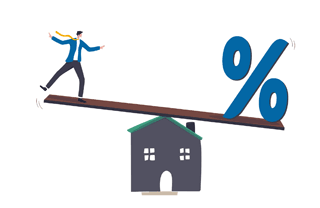Quote Of The Week
“A substantial relaxation of planning restrictions would enable more construction and hence less expensive housing.”
Centre for Independent Studies chief economist Peter Tulip
RBA Refutes Property Doomsayers
 The Reserve Bank of Australia deputy governor has dismissed concerns that interest rate rises will have a negative impact on the housing market.
The Reserve Bank of Australia deputy governor has dismissed concerns that interest rate rises will have a negative impact on the housing market.
Michele Bullock says most households can handle a potential 3 percentage point increase in the cash rate.
This, she says, is because many borrowers are well ahead on their mortgage repayments, have significant savings and good equity in their homes.
Bullock says most borrowers had been assessed under very strict criteria in recent years to ensure they could afford any interest rate rises.
She says the current cash rate of 1.35% must go a “fair bit higher” for the economy to reach a balanced level, while RBA Governor Philip Lowe says that balanced or neutral rate is probably “at least” 2.5%.
Their comments come as Commonwealth Bank of Australia economist Gareth Aird and Coolabah Capital head Christopher Joye expressed concerns that higher rates will cause house price falls and lead to a reduction in household wealth. But Bullock disagrees.
Rising Migrants Lift Rental Searches
 A return of migrants and international students is putting further strain on the rental market.
A return of migrants and international students is putting further strain on the rental market.
PropTrack’s Overseas Search Report reveals searches on realestate.com.au from overseas increased by 23% in June compared with the same time last year.
Rental searches accounted for 71% of the overseas activity during June, while 7% of searches were for properties for sale.
Searches from China jumped a massive 432% during June, India is up 197 %, and Hong Kong is up by 100%.
PropTrack economist Angus Moore believes the current increase in searching activity is from migrants and students, not expats.
“When we look at ABS data, we are starting to see migrants come back,” he says.
“It’s nowhere near what we were seeing pre-pandemic but there are signs it’s returning.
“If we think about the composition of temporary migrants in Australia, it’s largely students, working holidaymakers and, to some extent, temporary work visas. Most of those people are going to be looking for rentals.”
Increased Density Could Ease Price Issues
 Allowing higher density development in Australia could help ease housing affordability issues, according to analysis of New Zealand planning changes.
Allowing higher density development in Australia could help ease housing affordability issues, according to analysis of New Zealand planning changes.
Auckland “up-zoned” about three quarters of the city in 2016 in response to a housing affordability crisis. The changes allowed for the construction of townhouses, terraces and units within 20km of the CBD.
Research by the Cowles Foundation for Research in Economics at Yale University found that, as a result, Auckland has built an extra 26,903 homes in the past five years.
Report author Dr Ryan Greenaway-McGrevy says the success can be attributed in part to the almost blanket introduction of higher density development throughout the inner suburban area of Auckland.
“If cities are considering up-zoning they really need to shy away from only small, targeted areas that are permitted to build up and think about implementing the policy more broadly,” he says.
Brendan Coates of the Grattan Institute says these kinds of policies could lower the cost of housing in Australia by 12.5%.
Govt Charges Deter Foreign Buyers
 While Australia needs foreign investment to help power the economy, higher application fees for foreign investors are expected to deter them from buying here.
While Australia needs foreign investment to help power the economy, higher application fees for foreign investors are expected to deter them from buying here.
Property Council of Australia chief executive Ken Morrison says the July 29 doubling of foreign investor fees is not a solution to fix housing affordability issues in Australia.
“The Property Council supports moves to tackle the challenge of housing affordability and supply but increasing costs on and deterring investment in the creation of new housing works against this goal,” he says.
The fees vary depending on properties, but for example investors will now pay $13,200 for properties which are priced $1 million or less.
Morrison says all the fee increases do is make Australia seem hostile to outside investment.
“We should be welcoming foreign investment with open arms, not sending the opposite message by doubling these fees which are already much larger than our competitors and apply to far more transactions,” he says.
Macquarie Bank Cuts Variable Rate
 Macquarie Bank cut its variable interest rate by up to 25 basis points just a few weeks after increasing it by 50 basis points.
Macquarie Bank cut its variable interest rate by up to 25 basis points just a few weeks after increasing it by 50 basis points.
Just a few days before the rate rise in July, Commonwealth Bank also cut its lowest variable rate by 0.15%, while ME Bank reduced some of its variable rates.
The rate drops appear to be a push for better market share, with many of the reduced variable rates being offered just for new customers.
Macquarie Bank, which has been trying to gain a bigger foothold in the market, dropped its variable rate on a number of loans for owner occupiers and investors.
The RBA is set to meet again next week with many predicting a further rate increase.
ANZ is predicting the official cash rate will be above 3% before the end of the year. It has tipped successive rate rises in August, September, October and November. However the Commonwealth Bank says the official rate will not go that high.




